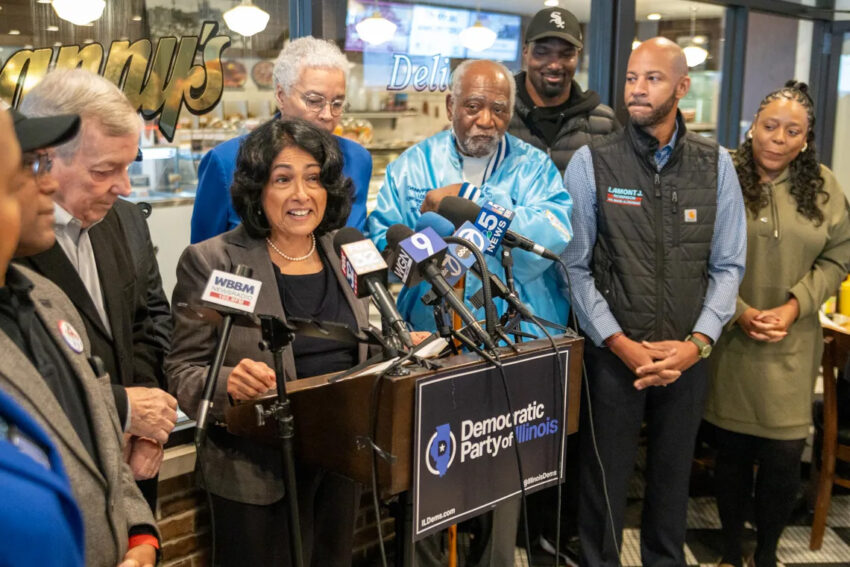by Jerry Nowicki, Andrew Adams, and Peter Hancock | Capitol News Illinois
Preliminary, unofficial election results show no seats in the state House or Senate have changed party hands, although a few races remained too close to call according to the Associated Press.
That means Democrats will maintain supermajorities in each chamber of the General Assembly even as President Donald Trump appears to have vastly outperformed his previous two showings in the state in 2016 and 2020.
The AP called the presidential race for Trump early Wednesday, and with an estimated 93% of votes counted, he trailed Vice President Kamala Harris in Illinois by about eight percentage points. If the total holds, it’s about half of the margin of victory enjoyed by Democrats in the state in each of the past four presidential cycles.
Illinois’ representation in Congress also appears unlikely to change. Democratic U.S. Rep. Eric Sorensen withstood a challenge in the 17th Congressional District of northwest Illinois, beating Republican challenger Joe McGraw, 54% to 46%, meaning Democrats will keep their 14-3 advantage in the state’s congressional delegation.
“Now, it’s about coming together to do what’s best for all of us and I am proud to be the good neighbor to represent you,” Sorensen said in a statement late Tuesday night. “We have a lot of challenges and hard work ahead of us, but I can tell you the sun will rise tomorrow morning and our forecast is bright.”
And in Cook County, early returns showed Democrats poised to sweep all county-level offices that were up for election, including state’s attorney, while voters in Chicago cast ballots in their first-ever elections for local school board seats.
General Assembly
As of early Wednesday, unofficial results showed Democrats were poised to likely keep their 78-40 supermajority in the Illinois House and their 40-19 control of the Senate, although a few races proved to be highly competitive.
That was true in the 52nd House district, where incumbent Republican Rep. Martin McLaughlin, of Barrington Hills, was leading Democratic challenger Maria Peterson, 51% to 49%, a margin of fewer than 1,000 votes.
And in the 47th House District, incumbent Republican Rep. Amy Grant, of Wheaton, was leading Democrat Jackie Williamson, 50.4% to 49.6%, a margin of just 500 votes.
Another uncalled race is in the 76th District that includes parts of DeKalb, LaSalle and Bureau counties. Democrat Amy Briel led Republican Liz Bishop by less than 700 votes in the race to succeed retiring Democrat Lance Yednock.
The race was also too close to call for a pair of incumbents – 91st District Rep. Sharon Chung, D-Bloomington, and 104th District Rep. Brandun Schweizer, R-Danville, in two central Illinois races. As of Wednesday morning, the AP hadn’t tallied all the votes in Champaign or McLean counties. A Capitol News Illinois analysis 91st District data showed Chung handily winning that race by about 3,500 votes, while Schweizer had a lead of 771 votes in the 104th District with some mail votes outstanding.
In the 112th District in the Metro East area outside St. Louis, Democratic Rep. Katie Stuart, of Edwardsville, was leading Republican challenger Jay Keeven, also of Edwardsville, 54% to 46%.
That district was at the center of a debate during the spring legislative session when Democrats pushed through a bill to ban the practice of political parties “slating” candidates for a race after a primary election if no candidate from that party ran for the nomination.
That bill passed the General Assembly in May, even though candidates from both parties, including Keeven, were already actively gathering petition signatures to fill vacant ballot positions.
The Illinois Supreme Court eventually ruled that law couldn’t go into effect in 2024, allowing Keeven to remain on the ballot.
And in the neighboring 114th District, former Democratic Rep. LaToya Greenwood, of East St. Louis, appeared far behind in her attempt to retake the seat she lost following redistricting in 2022 to Republican Rep. Kevin Schmidt. Unofficial returns from that rematch showed Schmidt holding onto lead of less than 2,000 votes with 78% of votes counted. Although the AP had not called the race as of Wednesday, Schmidt issued a news release claiming victory.
Statewide and local referendums
Three statewide “advisory questions” all passed on Tuesday, although they don’t carry any legal weight.
The first question concerned whether candidates should be subject to civil penalties if they interfere with election workers’ official duties. That passed with 88.9% of respondents voting ‘yes’ with an estimated 89% of votes counted.
The second asked voters whether Illinois should modify its constitution to allow for higher taxes on those with incomes over $1 million to pay for property tax relief programs. With an estimated 89% of votes counted, ‘yes’ had carried about 60.3% of the vote.
The third asked whether the state should require insurers that cover pregnancy benefits to also cover assisted reproductive treatments like in vitro fertilization. ‘Yes’ received 72.4% of the vote with 89% of votes counted.
Downstate, seven counties asked voters to consider whether they should explore separating from Cook County to form a new state, with all seven voting in favor of similarly phrased referendums.
This result means that 33 counties so far have voted in favor of exploring separation, just under one-third of Illinois’ 102 counties. In total, about 10.9% of Illinois’ population has voted on this issue, with every county where the question appeared on the ballot voting in favor of separation.
Madison County, which held a referendum on Tuesday, was the closest referendum yet – passing with 56.5% of the vote. The other six counties that voted on Tuesday ranged from about 71% to 77% voting in favor.
Chicago-area races
Chicagoans voted – for the first time – for elected school board members. Ten seats were up for grabs this election and the fiercely fought races brought out millions of dollars in spending from candidates and political committees.
As of Wednesday morning, three races were still too close to call. Of the seven where a winner is clear, three went to candidates backed by the Chicago Teachers Union. Three seats were won by candidates endorsed by either the charter school group INCS Action, a political action committee associated with the conservative Illinois Policy Institute or both. The final candidate wasn’t endorsed by any of those groups.
Recent decisions from leaders in Chicago Public Schools have raised questions about what actions the state might have to take in response. Some state Democrats began publicly considering looking at the level of state oversight at CPS following the resignation of its entire board last month amid tensions with Mayor Brandon Johnson and the CTU.
The election itself follows a fight among state-level Democrats earlier this year that saw competing proposals and a monthslong debate surrounding ethics rules for the reformed board and a timeline on when to hold the board’s first elections.
Other Cook County offices that were up for election were swept by Democrats, including county clerk, circuit court clerk and state’s attorney. Retired judge Eileen O’Neill Burke defeated Republican Bob Fioretti, a former Chicago alderperson, in a closely watched race to replace outgoing State’s Attorney Kim Foxx.
The outgoing prosecutor drew national attention for her progressive policies and her office’s handling of the 2019 Jussie Smollett case.

